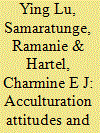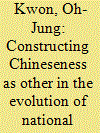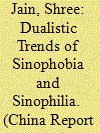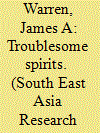| Srl | Item |
| 1 |
ID:
117935


|
|
|
|
|
| Publication |
2013.
|
| Summary/Abstract |
The Australian workforce is becoming increasingly diverse and it is important to understand the role of individuals' acculturation attitudes in the workplace. The appreciation of the relationship between acculturation attitudes and affective workgroup commitment is critical for mangers to facilitate the performance of employees with diverse backgrounds. To gain a better understanding of this relationship, we assessed the acculturation attitudes of professional Chinese immigrants and the relationship between these attitudes and affective workgroup commitment in the Australian workplace. Our survey of a sample of 220 professional Chinese immigrants in the Australian workplace revealed that, even though many of them favor integration, the majority adopt separation and marginalization, which were found to be related with low affective workgroup commitment. This study underscored the importance of acculturation attitudes to cultivate positive job-related outcomes, and provided useful information for organizations to manage immigrant employees via effective acculturation programs.
|
|
|
|
|
|
|
|
|
|
|
|
|
|
|
|
| 2 |
ID:
144692


|
|
|
|
|
| Summary/Abstract |
This paper presents the ambiguous and complex political re-socialisation of Chinese immigrant women and their encounter with Taiwanese identity. Contrasting their conceptions before and after migration along a central-peripheral conceptual hierarchy, this paper elaborates how their nationalistic curiosity and understanding of democracy confronted Taiwanese identity in their everyday life. These daily, sometimes mundane, experiences manifested the contradictions between the conceptual hierarchy and the ethnic divide and partisan politics in Taiwan. Their political re-socialisation proved that this conceptual hierarchy was inadequate to deal with the Taiwanese-Mainlander divide and the anti-China sentiment. Political re-socialisation gained through daily life gradually fed into their reaction to the Taiwanese identity. Situated amongst the antagonism between Taiwan and China, they were locked in an in-between form of tension and their subjective identification would therefore be challenged by the mutual suspicion and exclusion of both sides which demand their singular and undivided loyalty.
|
|
|
|
|
|
|
|
|
|
|
|
|
|
|
|
| 3 |
ID:
179527


|
|
|
|
|
| Summary/Abstract |
This study traces the way the evolving nature of the Korean national identity has shaped the construction of the Chineseness of immigrants as others. Two immigrant groups, Chinese immigrants called Hwagyo and Korean-Chinese referred to as Joseonjok, have constituted the majority of foreigners in Korea during different historical eras. Although Koreans assumed both represented ‘Chinese’ people, I argue that the core of their Chineseness was defined differently according to the evolving sense of the Korean subjectivity. The growth of the national economy and the culturally advanced and orderly society constituted the sources of the national character and provided legitimate grounds to discriminate against Chinese immigrants who were assumed to pose economic and cultural threats. This study suggests that the different logic of ‘othering’ is derived from the evolution of the Korean national identity in response to the nation’s changing economic and political circumstances.
|
|
|
|
|
|
|
|
|
|
|
|
|
|
|
|
| 4 |
ID:
189229


|
|
|
|
|
| Summary/Abstract |
The People’s Republic of China has invited both fascination and fear, admiration and contempt in the last few years. Various public opinion surveys’ data findings reveal a nuanced and conflicted phenomenon of ‘Sinophobia’ and ‘Sinophillia’ across the world nations. One view of China is that of an ‘autocratic,’ ‘anti-democratic’ regime provoking anxiety and suspicion reflected in a trending wave of anti-China sentiments evolving into ‘Sinophobia,’ with its prevalence and intensity highlighted in increasing cases of racism and violence towards immigrant Chinese after the novel coronavirus outbreak. The growing intensity of Sinophobia is noticed in countries witnessing a barging influx of Chinese investment with Chinese land grabs and the loss of native jobs. However, another view is of a nation that inspires vast admiration for its economic ascent and traditional culture. Today, China has an increasing appeal and attraction not just for its economic engagement but also for its culture, language and tourism.
|
|
|
|
|
|
|
|
|
|
|
|
|
|
|
|
| 5 |
ID:
126643


|
|
|
|
|
| Publication |
2013.
|
| Summary/Abstract |
Although alcohol has long been a feature of Thai society, historical evidence indicates that excessive drinking on a regular basis is a relatively recent phenomenon. During the nineteenth century, there were significant quantitative and qualitative changes in both alcohol consumption and production in Siam, due largely to the introduction of new alcoholic beverages and methods of distillation by Chinese immigrants and Western entrepreneurs. As public drunkenness became more common, excessive drinking was blamed for an apparent increase in violent crime throughout the kingdom. This paper examines how the Thai government tried to manage the upsurge in drunken behaviour and the obstacles it faced in doing so. Most of these problems stemmed from the limits on the kingdom's fiscal and judicial sovereignty imposed by the unequal treaties it had signed with the Western imperial powers; as such, they are indicative of Siam's semi-colonial status during this period.
|
|
|
|
|
|
|
|
|
|
|
|
|
|
|
|
| 6 |
ID:
166617


|
|
|
|
|
| Summary/Abstract |
In Africa, the number of small and medium-sized businesses owned by Chinese entrepreneurs is rapidly growing. However, the consequences of their economic interaction and social self-isolation are a topic of great debate in academia. This article seeks to explain their activities from the perspective of national identity. Everyday nationhood is the key conceptual framework used to explain how national identity restricts immigrants and their initiative to consume national identity. The main argument is that their domestic developmental situation drives them to open businesses so that survival is the leading force for everything they do, and to survive, they have to use various strategies to retain their advantages, such as opportunism, involution, the manipulation of relationships and internal competition. This article may contribute to research on the Chinese presence in Africa by examining the issue of national identity and its correlation with Chinese entrepreneurship.
|
|
|
|
|
|
|
|
|
|
|
|
|
|
|
|